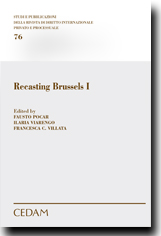-
Gallery of Images:

-
The recast Brussels Regulation ((EC) No, ) has application from 10 January 2015. The Brussels I Regulation established a set of EU rules that determine which court has jurisdiction in crossborder disputes and how court judgments issued in one EU Member State are recognised and enforced in another Member State. The new Brussels I Regulation (recast Regulation) covers, like its predecessor, the jurisdiction of courts and the recognition and enforcement of judgments in civil and commercial matters in crossborder disputes within the EU (excluding Denmark). Jurisdiction under the Brussels I Regulation The new Article 31(2) in the 2012 recast regulation allows courts to take jurisdiction in such cases even if it is not the court first seized. This clause is consistent with the 2005 Hague Choice of Court Agreements convention. From 10 January 2015, Regulation (EU) of the European Parliament and of the Council of 12 December 2012 on jurisdiction and the recognition and enforcement of judgments in civil and commercial matters (Brussels Regulation (recast)) applies. The Brussels Regulation (the original Regulation) which deals with jurisdiction and the recognition and enforcement of judgments on civil and commercial matters will be replaced as from 10 January 2015 with a revised Brussels Regulation (the recast Regulation). The 2001 Brussels I Regulation's (the Regulation) general principles regarding jurisdiction are preserved in the The Recast Brussels I Regulation (the Recast Regulation). The general principle remains that parties may mutually agree, by written agreement, which EU jurisdiction will hear disputes between them. responsibility, repealing Regulation (EC) No (hereinafter referred to as the Brussels IIa Regulation or the Recast or the recast proposal, in the case of the Commissions proposal). The recast Brussels Regulation has special provisions for insurance contracts, consumer contracts and individual contracts of employment, in each case designed to protect the party which is seen to be the weaker party to the contractual relationship (ie the insured, consumer or employee, respectively). Regulation will be referred to in this paper as the Recast Regulation. 2 Andrew Dickinson and Eva Lein, The Brussels I Regulation Recast (Oxford University Press, 2015). 3 Brussels Convention on jurisdiction and the enforcement of judgments in civil and commercial matters Regulation (EC) of December 22 nd 2000 on jurisdiction and the regulation and enforcement of judgments in civil and commercial matters (the Brussels 1 Regulation) has been recast to further facilitate the free circulation of judgments and to further enhance access to justice. Brussels I Regulation (recast) General information. Regulation seeks to facilitate access to justice, in particular by providing the rules on the jurisdiction of the courts and the rules on a rapid and simple recognition and enforcement of judgments in civil and commercial matters given in the Member States. The Regulation replaces Regulation (the Brussels I Regulation. In January 2015, EU Regulation (the Brussels I Regulation) will be replaced by EU Regulation (the Brussels I Recast) as the principal legislation governing, in civil and commercial matters before the EU The Brussels Regulation (the original Regulation) which deals with jurisdiction and the recognition and enforcement of judgments on civil and commercial matters will be replaced as from 10. The recast Brussels I Regulation came into effect on January 10, 2015, and includes revisions to the arbitration exception. Article 1 of the recast Brussels I Regulation continues to exclude arbitration from its scope. The future of antisuit injunctions in Europe. Brussels Regulation Recast: changes to EU rules on jurisdiction and the enforcement of judgments. The rules used by Member State Courts dealing with the allocation of jurisdiction and the reciprocal enforcement of judgments have been updated for cases commenced after 10 January 2015. This article sets out the key changes. The Brussels Regime is a set of rules regulating which courts have jurisdiction in legal disputes of a civil or commercial nature between individuals resident in different member states of the European Union the EU institutions adopted a recast Brussels I Regulation which replaced the 2001 regulation with effect from 10 January 2015. The Irish Court refused to grant orders declining jurisdiction pursuant to Article 29(3) and 30 (2) of the Recast Brussels Regulation, but granted a stay of the proceedings pursuant to Art 30(1) of the Recast Brussels Regulation. Accountability in practice: ensuring a dialogue between Data Protection Officers and IT experts, Panel moderated by Wojciech Wiewirowski, Data Protection within International Organisations, Workshop organised by the Office of the United Nations High Commissioner for Refugees and the European Data Protection Supervisor, Copenhagen, Denmark The revision of the Brussels I Regulation started in 2007, when the Heidelberg Report 4 was published and ended in December 2012 with the adoption of a recast Regulation. 5 In December 2010, the Commission presented a proposal for a revision of the Regulation. 6 One of the main points in the proposal was the interface between arbitration and. The (recast) Brussels I Regulation applies! Since 10 January 2015, the (recast) Brussels I Regulation on jurisdiction and the recognition and enforcement of judgments in civil and commercial matters applies (Regulation (EU) No ). The Brussels I Regulation has undergone a lengthy review process, resulting in Regulation (EU) of 12 December 2012 on jurisdiction and the recognition and enforcement of judgments in civil and commercial matters (recast). 1 Council Regulation on jurisdiction and the recognition and enforcement of judgments in civil and commercial matters. 2 Jurisdiction as between the EU and the EFTA states of Norway, Switzerland and Iceland is governed by the Lugano Convention which mirrors the Brussels Regulation as. Article 81 Brussels I Recast states that the Regulation shall enter into force on the twentieth day following its publication in the Official Journal of the European Union 8, but that it shall apply from the 10th of January 2015. The Proposal is a recast of Council Regulation (EC) No of 27 November 2003, repealing Regulation (EC) No (the socalled Brussels IIa Regulation, hereinafter the Proposal). The Brussels Regulation provides general rules with respect to jurisdiction. The basic principle is that the courts of the EU Member State in which the defendant is domiciled will have jurisdiction to hear the dispute, regardless of the defendant's nationality. Domicile is determined in accordance 1978 Accession Convention, 2 the Brussels I Regulation, 3 and the recent Brussels I Recast. 4 Arbitration is excluded because there are many international treaties on Neil Dowers is a PhD Candidate, University of Edinburgh, UK. TATO A UT ROUTO The Recast Brussels Regulation: What It Means For Commercial Parties 1 ARTHUR COX Februar 2015 On 10 January 2015 the Brussels Regulation which, since 2001, governed jurisdiction and the recognition and This note explains the jurisdictional rules in Regulation (EU) of the European Parliament and of the Council of 12 December 2012 on jurisdiction and the recognition and enforcement of judgments in civil and commercial matters (Recast Brussels Regulation). Brussels I Regulation will continue to apply unless, pursuant to Article 3 of the Agreement of 19 October 2005 between the EC and Denmark on jurisdiction, it decides to implement the Recast. Handy client guide to jurisdiction under recast Brussels Regulaton: Decision tree notes (Steps) We have published a client guide to the English courts jurisdiction under the recast Brussels Regulation (No ), which applies to proceedings commenced on or after 10 January 2015. The Brussels I Regulation has undergone a lengthy review process, resulting in Regulation (EU) of 12 December 2012 on jurisdiction and the recognition and enforcement of judgments in civil and commercial matters (recast). Since a number of amendments are to be made to that Regulation it should, in the interests of clarity, be recast. (2) At its meeting in Brussels on 10 and 11 December 2009, the European Council adopted a new multiannual programme entitled The Stockholm Programme an open and secure Europe serving and protecting citizens ( 4 ). The Recast Brussels Regulation (EU ) came into force on 10 January 2015. It has been designed to remedy some of the perceived defects in its predecessor regulation, the Brussels. Instrument: Brussels I recast Article 65(3) Information on how to determine, in accordance with national law, the effects of the judgments referred to in Article 65(2) of the Regulation Article 74 Description of national rules and procedures concerning enforcement The Recast Brussels Regulation (Council Regulation (EU) ) (Recast) came into force on 10 January 2015 replacing the Brussels Regulation (Council Regulation (EC) ). The key aim of the Recast was to update the set of rules on jurisdiction and enforcement of judgments in civil and commercial matters within the EU. This article considers the key changes in the Brussels Regulation (recast) (Regulation (EU), the Recast) for commercial parties. Specifically, it considers: Amendments to the rules relating to the jurisdiction agreements, expanding the scope of application of those rules. The Recast Brussels Regulation makes significant amendments to various provisions of the Brussels Regulation in order to rectify some of its shortcomings. Amongst these is the ineffectiveness of exclusive jurisdiction clauses in disarming torpedo actions, as illustrated by the Gasser v MISAT case. The Danish Ministry of Justice has confirmed that the Recast Brussels Regulation was implemented by Denmark by Danish Law No. 518 of 18 May 2013 (containing amendments to the act on the 2001 Brussels Regulation), which entered into force on 1 June 2013. The Brussels Regulation (Regulation (EC) ) has governed questions of jurisdiction and the recognition and enforcement of judgments in civil and commercial matters within the EU for over a decade. From 10 January 2015, it will be repealed and replaced by Regulation (EU) (the Recast Regulation). The Brussels Regulation has undergone an extensive period of review and, from 10 January 2015, the revised Brussels Regulation (that is, the Brussels Regulation (recast)) will. Brussels Regulation, rather than a radical overhaul of those rules. Like its predecessor, the Recast Regulation applies to questions of jurisdiction and the recognition and enforcement of judgments in civil After 10 years of application, Council Regulation (EC) N of December 22, 2001 on jurisdiction and the recognition and enforcement of judgments in civil and commercial matters (known as Brussels I Regulation) is being recast. enforcement of judgments in civil and commercial matters (Recast) Delegations will find attached a proposal from the Commission, submitted under a covering letter matters (hereafter Brussels I). Regulation Brussels I is the matrix of civil judicial cooperation in the European Union. It This proposal is a recast of Council Regulation (EC) No of 27 November 2003 The Brussels IIa Regulation is the cornerstone of judicial cooperation in family matters in the European Union. It establishes uniform jurisdiction rules for divorce, separation and the Article 68 of the Brussels I Recast Regulation specifies that the Regulation supersedes the 1968 Brussels Convention except for some territories of Member States that. On 21 November 2017, Parliament's Committee on Legal Affairs adopted its report on the Commission proposal for a recast Brussels IIa Regulation concerning the 'free movement' of judgments in nonpatrimonial family matters. subsequent reforms and modernisation, including the Brussels I Regulation and the recent Brussels I Recast in 2015. Arbitration is excluded because there are international treaties on. The Brussels I Regulation Recast has been published in the Official Journal, OJ 20 December 2012, L 3511. The Brussels I Regulation Recast will apply from 10 January 2015 (see Article 81). The Brussels I Regulation Recast will apply from 10 January 2015 (see Article 81). Recast Brussels I Regulation: What you need to know New rules on jurisdiction and enforcement of judgments are now applicable across the EU The importance of the Brussels I Regulation [1 is well known to EU litigators..
-
Related Images:











